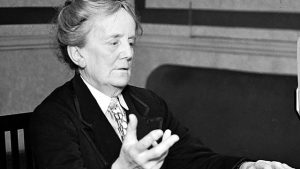UPDATE: Read a review of the “The Prison”s American debut.
While composer Ethel Smyth (1858-1944) has some name recognition, one of her most important works, the concert-length cantata “The Prison”, has never been performed in the U.S.. An amazing NYC- choir, Cantori, will perform the work May 14 & 15. Please help to spread the word!!
Smyth is beginning to achieve her deserved acclaim for her music, acclaim that was denied in her lifetime and the decades following. High-profile performances of her monumental works has brought about this sea-change, including last summer’s U.S. premiere staged performance of her great opera, “The Wreckers,” and the New York premiere of Smyth’s Mass (in Carnegie Hall) in 2013. We are thrilled that this long-overdue performance of “The Prison” will be offered by this outstanding choral ensemble, Cantori, directed by Mark Shapiro (who led the 2013 Mass performance). Composed in 1930, and based on a text by Smyth’s dear friend and lover, Henry Brewster, the work is a dialogue between a prisoner and his soul, portrayed by soprano and baritone soloists. Smyth chose this phrase as a motto for the work: “I am striving to release that which is divine within us, and to merge it in the universally divine.”
Brewster had died in 1908, and one of Smyth’s goals in setting his words to music, was to bring his writing to the attention of a wider audience. The text is drawn from his philosophical book “The Prison” and the phrase quoted above is by the Greek philosopher Plotinus. Smyth underscores this connection with ancient Greece by quoting two Greek melodic fragments which had only recently been deciphered. Seeking to avoid the religious associations of the genres of cantata or oratorio, Smyth labelled the work as a “Symphony.” Yet some authors have compared it to the genre of opera, since it includes dramatic elements, including the dialogue by the two soloists, the active role by the chorus, and vivid, atmospheric instrumental tone-poems, along the lines of the ones that she wrote for “The Wreckers.” 
While other works by Smyth have been recorded, “The Prison” has escaped attention so far. How is it that this crowning work by this well-known composer has not previously been performed in the U.S.? Is it because audiences and ensembles prefer the more light-weight fare, or the repetition of familiar warhorses? We hope that this performance will offer a thoughtful and significant alternative that will be recognized and taken up soon by more ensembles.
